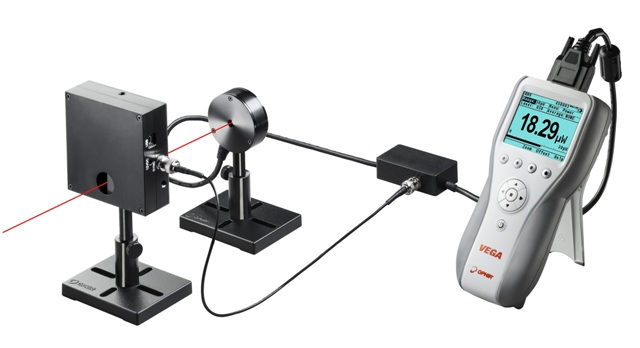Ophir Photonics, global leader in precision laser measurement equipment and a Newport Corporation brand, today announced the RM9 Radiometer, a sensor for measuring the power of very low level CW or quasi CW sources.
The RM9 uses a pyroelectric sensor in conjunction with an 18Hz chopper to measure a wide range of radiation, from UV to deep IR. Unlike other more expensive radiometers, the RM9 is calibrated over the entire range of wavelengths, from 0.15 µm to 12 µm, not just a single wavelength. The sensor also features a digitally synthesized lock-in amplifier which reduces external noise to a minimum; this allows the sensor to measure power levels as low as 100 nW or less. The output of the sensor can be displayed on any standard Ophir meter or on a PC.
 Ophir Photonics’ RM9 Radiometer
Ophir Photonics’ RM9 Radiometer
Designed for detecting very low power radiation, the RM9 Radiometer features an 8mm aperture. It combines very low noise levels (~30 nW over 10s) with fast response times (3.5 s with display). The sensor measures power levels from 100nW to 100mW.
To display measurements, the RM9 Radiometer can connect directly to any standard Ophir meter or PC interface. This means no additional power module is required, as is the case with traditional radiometers. The RM9 works with Ophir¹s StarLite, Nova II, and Vega smart displays, and Juno PC interface.
The display is automatically configured and calibrated when plugged into one of the company¹s laser measurement heads.
Availability
The RM9 Radiometer is available now. OEM pricing available on request.
RM9 product page: http://ow.ly/HAE9u
About Ophir Photonics
With over 30 years of experience, Ophir Photonics, a Newport Corporation brand, provides a complete line of instrumentation including power and energy meters, beam profilers, spectrum analyzers, and goniometric radiometers. Dedicated to continuous innovation in laser measurement, the company holds a number of patents, including the R&D 100 award-winning BeamTrack power/position/size meters and Spiricon's Ultraca, the baseline correction algorithm that helped establish the ISO 11146-3 standard for beam measurement accuracy. The Photon family of products includes NanoScan scanning-slit technology, which is capable of measuring beam size and position to sub-micron resolution. The company is ISO/IEC 17025:2005 accredited for calibration of laser measurement instruments. Their modular, customizable solutions serve manufacturing, medical, military, and research industries throughout the world. For more information, visit http://www.ophiropt.com/photonics